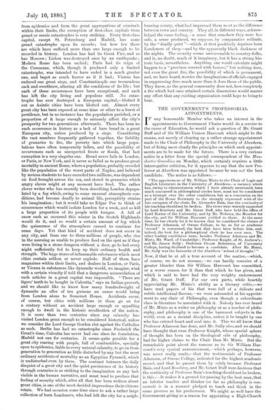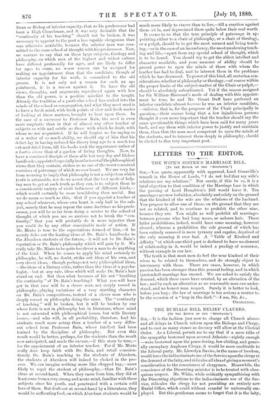THE GOVERNMENT'S PROFESSORIAL APPOINTMENTS.
IF any honourable Member who takes an interest in the appointments to Government Chairs would do a service to the cause of Education, he would ask a question of Mr. Grant
Duff and of Sir William Vernon Harcourt which might be the means, not merely of clearing up a rather strange appointment made to the Chair of Philosophy in the University of Aberdeen, but of fixing more clearly the principles on which such appoint- ments are to be made for the future. There is a very curious
notice in a letter from the special correspondent of the Man- chester Guardian on Monday, which certainly requires a little interrogative criticism, for it appears to say that the new Pro- fessor at Aberdeen was appointed because he was not the beet candidate. The notice is as follows :— "The appointment of Mr. William Minto to the Chair of Logic and English Literature in the University of Aberdeen—a vacancy which has, owing to circumstances which I have already mentioned, been much canvassed in philosophical circles here, must not be considered as a triumph over the other candidates, but as a concession on the part of the Home Secretary to the strongly expressed wish of the late occupant of the chair, Dr. Alexander Bain, that the continuity of his teaching should not be broken. His views were warmly supported by Lord Rosebery and Mr. Grant Duff, who have held the office of Lord Rector of the University, and by Mr. Webster, the Member for the city, and Sir William Harcourt yielded to them. At the same time, he has clearly let it be known that he considered the claims of Professor Adamson, of Owens College, to be, so far as academie 'record' is concerned, the best that have been before him, and, indeed, the best for a philosophical chair he has ever seen. The other leading candidates were, besides Professor Adamson and Mr. Minto, Mr. Ward, of Cambridge ; Professor Knight, of St. Andrew's ; and Mr. James Sully ; Professor Croom Robertson, of University College, having declined to become a candidate. After Mr. Mint*, Mr. Sully was the favourite of the Aberdeen school of thought.'"
Now, if that be at all a true account of the matter,—which, of course, we do not assume,—we can hardly conceive of a greater blunder than Sir William Harcourt has committed, or a worse reason for it than that which he has given, and which is said to have had the very weighty endorsement of Mr. Grant Duff. For our own parts, while heartily appreciating Mr. Minto's ability as a literary critic,—we have read papers of his that were full of a delicate and subtle intellectual flavour,—we were astounded at his appoint- ment to any chair of Philosophy, even though a subordinate class in literature be associated with it. Nobody has ever heard of Mr. Minto as a writer on philosophy or as a teacher of philo- sophy, and philosophy is one of the barrenest subjects in the world, even as a mental discipline, unless it be taught by one who has entered heart and soul into it. 'This we all know that Professor Adamson has done, and Mr. Sully also, and we should have thought that even Professor Knight, whose special sphere of thought has been on the theological side of philosophy, had far higher claims to the Chair than Mr. Minto. But the remarkable point about the rumour as to Sir William Har- court's very cynical announcement,—which perhaps, however, was never really made,—that the testimonials of Professor Adamson, of Owens College, indicated far the highest academic record, and that he passed them by solely because Professor Bain, and Lord Rosebery, and Mr. Grant Duff were desirous that the continuity of Professor Bain's teaching should not be broken, is this :—It makes it a ground for passing by the best man, that an inferior teacher and thinker (so far as philosophy is con- cerned) is in a manner pledged to teach and think in the same grooves as his predecessor. We might as well have the Government giving as a reason for appointing a High-Church Dean or Bishop of inferior capacity, that as his predecessor had been a High Churchman, and it was very desirable that the "continuity of his teaching" should not be broken, it was necessary to appoint to the post a less capable clergyman than was otherwise available, because the inferior man was com- mitted to the same school of thought with his predecessor. Now, we venture to say that on these large subjects, theology and philosophy, on which men of the highest and widest culture have differed profoundly for ages, and are likely to differ for ages to come, no worse reason can be assigned for making an appointment than that the candidate, though of inferior capacity for hi s work, is committed to the old groove, it is not only not a reason for such an ap-
pointment, it is a reason against it. To have the old views, thoughts, and arguments reproduced again with less than the old power, is a positive mischief to the taught. Already the tradition of a particular school has soaked into the minds of the school or congregation, and what they most need is to have a fresh mind, with fresh points of view and fresh modes of looking at these matters, brought to bear upon them. In the case of a successor to Professor Bain, the need is even more emphatic than in that of almost any other teacher of subjects so wide and subtle as those with which he dealt, with whom we are acquainted. If be will forgive us for saying so of a writer of so much ability, we should say of him that his defect lay in having reduced his theory long ago to a much too cut-and-dried form, till his books took the appearance rather of a hortas siccus than of a garden of living thoughts. Now, to have a convinced disciple of these able but very dry and lifeless handbooks, appointed especially in order to retail the philosophical views that they contain, strikes us as one of the worst conceived exercises of patronage of which we ever heard. We are very far from meaning to imply that philosophy is not a subject on which truth is attainable, nor do we assert that the best mode of help- ing men to get at such truth as they can, is to subject them to a considerable variety of vivid influences of different kinds,— which would certainly be more bewildering than useful. But we do mean so much as this,—that if you appoint a teacher of any school whatever, whose own heart is only half in the sub- ject, merely that he may repeat the same doctrines as his prede- cessor, you will be so far from doing a service to the school of thought of which you are so anxious not to break the "con- tinuity," that you will probably do it more injustice than you could do by any other conceivable mode of action. If Mr. Mint() is true to the expectations formed of him,—if he merely doles out the leading ideas of Dr. Bain's handbooks to the Aberdeen students of the future,— it will not be Dr. Bain's reputation or Dr. Bain's philosophy which will gain by it. We really take Mr. Miuto to be quite too clever a man to do anything of the kind. When lie conies to apply his mind seriously to philosophy, he will, no doubt, strike out ideas of his own, and very clever ideas,—though perhaps not very philosophical ideas, —the ideas of a literary critic, rather than the ideas of a psycho- logist,—but at any rate, ideas which will make Dr. Bain's hair stand on end. But then what becomes of his not "breaking the continuity" of Dr. Baiu's teaching ? What you will have got in that case will be a clever man, not deeply versed in philosophy, playing variations of a very startling character on Dr. Bain's compositions, instead of a clever man who is deeply versed in philosophy doing the same. The "continuity of teaching" will be broken, but it will be broken by one whose forte is not in philosophy but in literature, whose mind is not saturated with philosophical issues, but with literary issues,—and who will, in all probability, therefore, lead his students much more astray than a teacher of a very differ- cut school from Professor Bain, whose intellect had been trained by the discipline of philosophy. But even this result would be better, perhaps, for the students than the result now anticipated, and made the excuse,—if this story be true,— for the appointment of an inferior teacher. For if Mr. Minto really does keep faith with Dr. Bain, and retail conscien- tiously Dr. Bain's teaching to the students of Aberdeen, the students of Aberdeen will indeed be choked in the pro- cess. We can imagine nothing more like chopped hay,—more likely to repel the student of philosophy,—than Dr. Bain's ideas at second-hand. When they came from him, they did at least come from a very strong and acute mind, familiar with these subjects since his youth, and penetrated with a certain cold love of them. But dealt out at second-hand by a litteratenr, they would be suffocating food, on which Aberdeen students would be
much more likely to starve than to live,—till a reaction against them set in, and depreciated them quite below their real worth
It seems to us that the true principle of patronage in ap- pointing either to a chair of philosophy, or a chair of theology, or a pulpit, should be to get the most earnest and living teach- ing,—or in the case of an incumbency, the most awakening teach- ing and life,—apart from any special school of thought, which is to be found. You should try to get the ablest intellect and character available, and your measure of ability should be proved power to open the minds of those with whom the teacher has had to deal, and to interest them in the problems which he has discussed. To power of this kind, all sectarian con- siderations, whether of philosophy or theology,—of course within the proper limits of the subject-matter of the Chair or pulpit,— should be absolutely subordinated. Yet if the reason assigned for Sir William Harcourt's mode of dealing with this appoint- ment be true, he and Mr. Grant Duff have preferred an inferior candidate almost because he was an inferior candidate, —inferior, that is, for the purposes of the Chair principally in question,—their excuse being that a few injudicious persons thought it even more important that the teacher should say the same questionable things which have been said for many years back, and say them with inferior power to justify and maintain them, than that the man most competent to open the minds of the students, and to interest them deeply in philosophy, should be elected to this very important post.



































 Previous page
Previous page